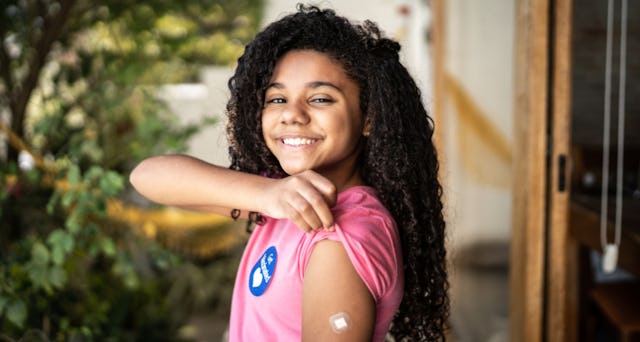5 Ways To Nurture Your Kids’ Mental Health As They Get Vaccinated And Move Toward Normalcy

Transitions can be hard for anyone, but for some kids, they can be especially difficult to manage. And the last few years have made for some pretty stressful transitions. There was the transition to remote learning, then to hybrid, then back to school with masks — and now, as more children become vaccinated, there will be the transition to more in-person social activities, like playdates and sleepovers and sports.
Changes – while exciting and fun – might also be stressful for some kids, especially those who suffer from anxiety. Their struggles come from an understandable place of fear, according to the Child Mind Institute. “It could be fear of the unknown, or fear of what’s going to happen when they’re put in a new situation,” Michael Rosenthal, PhD, a clinical neuropsychologist, told the Child Mind Institute. And we know that kids’ mental health has suffered during the pandemic, from a reported increased feeling of sadness to a jump in mental health-related ER visits.
So how can we help navigate transitions while protecting and nurturing our kids’ mental health? As a parent, you can start by creating a sense of belonging. “Feeling connected and welcomed is essential to children’s positive adjustment, self-identification, and sense of trust in others and themselves,” the National Association of School Psychologists (NASP) states on their website. “Building strong, positive relationships among students, school staff, and parents is important to promoting mental wellness.”
But how does a parent do that, especially as younger children get vaccinated and begin to resume more “normal” activities after almost two years of anything-but-normal?
Build a network of support.
Children need to know that they have a team of people who are there to help them – parents, teachers, coaches, and other trusted adults. The Child Mind Institute says that feeling safe is critical to kids’ mental health, and this includes feeling safe at school. Talk to your child’s teachers, coaches, and others about any concerns you might have so that you can build a valuable network of support for them.
Nurture our own mental health.
Our children are always watching and observing, and the way that we talk about and nurture our own mental health will go a long way in protecting and nurturing our kids’ mental health too. Talk about your own mental health in front of your kids. If you see a therapist, acknowledge this openly.
On Our Sleeves, a movement for children’s mental health, also reminds us to practice what we preach. “If you’re really feeling stuck, seek help from the guidance of a therapist, physician or spiritual director for yourself,” their site reads. “A trusted third party can provide a new perspective into your child’s behavior. It will also send a great message to your child that it’s okay to reach out for help.”
When it comes to Covid-related stresses (of which there are many), it’s important to try not let our own anxieties negatively impact our kids’ mental health. “Watch out for catastrophic thinking,” Mark Reinecke, PhD, a clinical psychologist, told the Child Mind Institute. “Keep a sense of perspective, engage in solution-focused thinking and balance this with mindful acceptance.”
Develop and nurture competencies.
The NASP recommends reminding kids that they have the skills and tools needed to overcome challenges, thereby boosting their confidence. When a child has something they feel comfortable, competent, and confident doing – whether it’s playing the piano, swimming, or reading – they will feel more competent when it comes to dealing with stress. The same applies here.
Get extra help if needed.
If your child continues to struggle, do not hesitate to get extra help. It might take some time to find a therapist that your child feels comfortable and connects with, but keep at it. And talk to your child’s pediatrician.